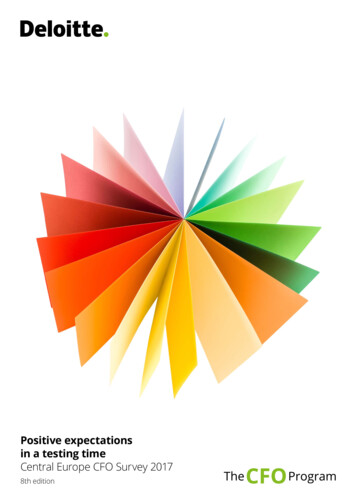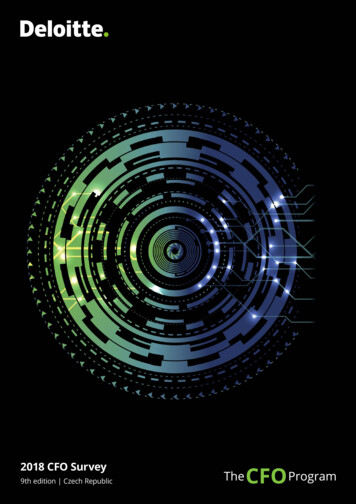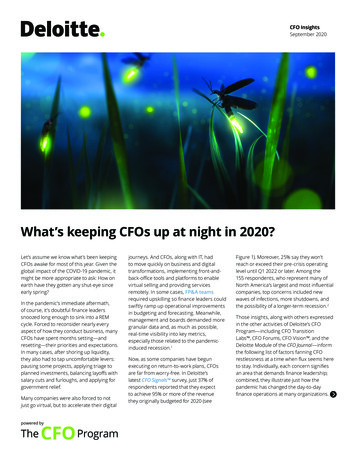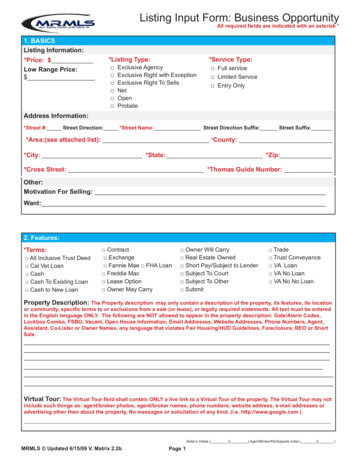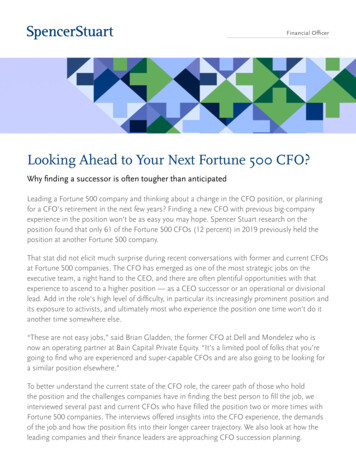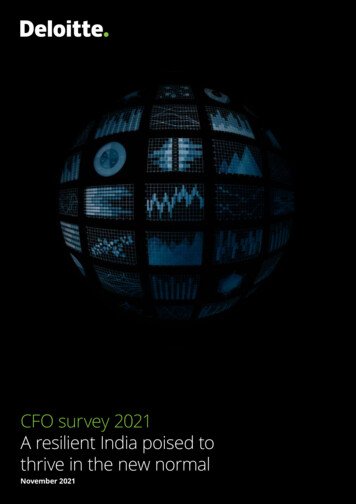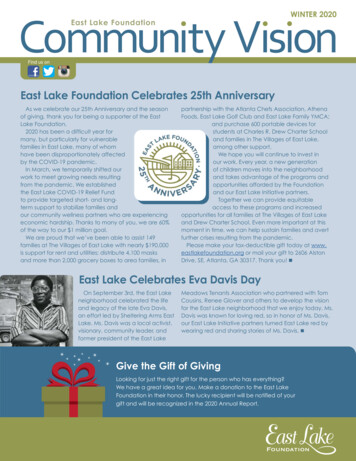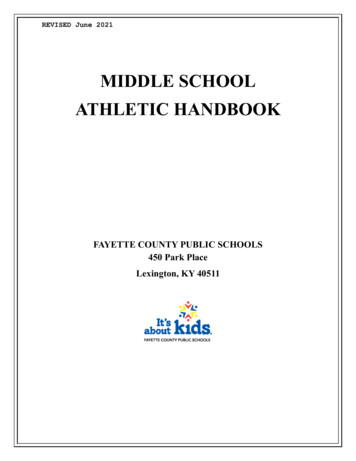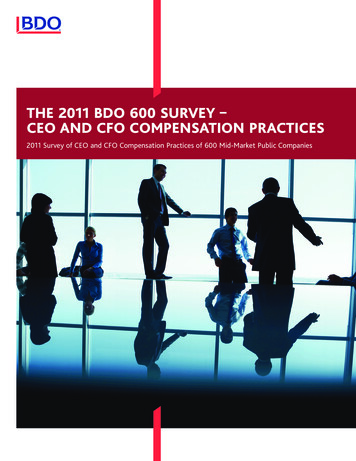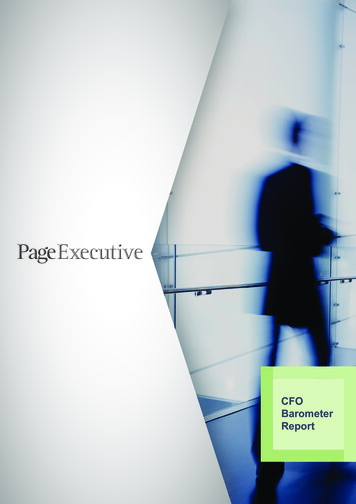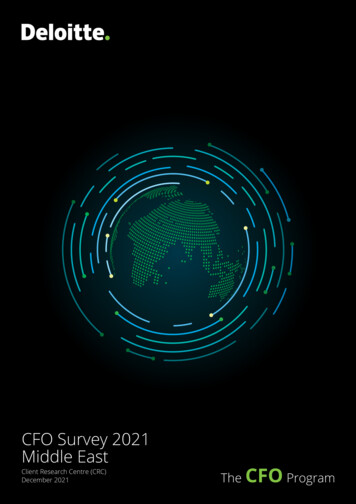
Transcription
CFO Survey 2021Middle EastClient Research Centre (CRC)December 2021The CFO Program
Middle East CFO Survey CFO Survey 2021Overall level of uncertainty has reduced asCFOs feel optimistic about financial prospectsand recoveryRespond toCOVID-19Recover fromthe pandemicThrive inpost-pandemicworldFutureexpectations258%CFOs chose Digitalisation as themost effective measure to mitigatethe adverse impacts of COVID-1976%CFOs are optimistic about recovery overthe next 12 months and anticipatingrevenue to increase81%CFOs expect their workforce to return tooffice full-time as compared to 24%in Europe57%CFOs feel more optimistic about thefinancial prospects of their companiesin 2021 compared to 12 months ago
Middle East CFO Survey CFO Survey 2021Impact ofCOVID-19“We have proven our resiliency,tested our systems, identifiedweaknesses.”“Change of mentality and conceptof how to approach operationsand unforeseen events.”3
Middle East CFO Survey CFO Survey 2021Phase of COVID-19Business leaders have faced unprecedented uncertainty since the start of the pandemic. As we moved to2021, leaders have also made significant progress in implementing an action plan which demonstratedtheir resilience and agility, and have likely made them better prepared for future unpredictability.Thrive: Preparing for andshaping the post-pandemicfuture15%Respond: Managing continuityand ensuring company survival23%202041%52%33%36%Recover: Learning from thepandemic and recovering“[Covid-19] Has made usa more agile organisationand open to new ways ofworking.”42021Phase of COVID-19What phase is your organisation currently in?
Middle East CFO Survey CFO Survey 2021Phase of COVID-19 (continued.)More than 50% of businesses have moved to the Thrive phase in 2021. Among the various industries,Energy, Resources & Industrials; Consumer Businesses and Financial Services have made the mostprogress in shifting from a short-term focus on ensuring continuity and survival to a more long-termfocus on the post-pandemic future.Thrive phase of COVID-19 by industryWhat phase is your organisation currently in?Energy, Resources& Industrials75%63%Holding/Group58%Financial ServicesConsumer Business,Transportation & THL55%Life Sciences & Healthcare33%Manufacturing33%Real Estate33%Others45%"In our business, thoughinitially we saw a downturnbut recovered fully towardsend of the year and we haveimproved our systems andprocedure which will helpus in dealing with futurechallenges.""Will hopefully not affect theconstruction sector in thelong term but at a companylevel, it re-emphasizes theimportance of being able toreact quickly to major eventsand the importance of costmanagement as a first reaction."5
Middle East CFO Survey CFO Survey 2021Respond“Acceleration of transformation froman operating model and digitalisationstand point, increased focused onclient experience and discretionaryspending is probably gone for quitesome time.”“Provided a burning platform todrive digital transformation.”6
Middle East CFO Survey CFO Survey 2021Respond: Impact of COVID-19 on financialmetricsCOVID-19 had an adverse impact on almost all financial KPIs. More than 50% of CFOs have faced anadverse or severely adverse impact for all financial metrics used by companies, except the number ofemployees.Receivable collection period and supply chaincontinue to be the most adversely impactedmetrics with 70% of CFOs witnessing either anadverse or severely adverse impact.Revenue and profitability have also beenimpacted adversely with businesses losingexisting customers and having difficultyattracting new customers. In addition, the levelof investment remained low in these uncertaintimes.One positive outcome which CFOs spokeabout is the impact on the number ofemployees. Though businesses have sufferedin terms of working capital and margins, mostleaders did not let it result in high job losses."The impact has been adversesince people's capacity to payhas been reduced substantially.""We have lost customers forthese two years from bothfinancing and after sales parts ofthe business. "Degree of impactHow would you rate the degree of impact caused by COVID-19on the below key financial metrics?Receivable collection period30%49%Supply Number of employees3%21%10%51%36%Discretionary spend12%31%39%Operating verely7
Middle East CFO Survey CFO Survey 2021Respond: Mitigating measuresThe pandemic has acted as a catalyst for digital transformation initiatives for businesses. Digitalisationhas turned out to be the most effective measure in mitigating the impact of COVID-19, 58% of CFOsranking it as the highest priority item.Degree of impactHow would you rate the degree of impact caused by COVID19- on the below key financial metrics?Turnaround ofunderperforming businessIndirect spend reduction3% 4%7%10%3% 3%3% 6%12%Extended/sought new financing4% 6%Staff salary reductions12%6% 4%10%3%3%3% 6%Pricing changes6%6%Revenue growth initiativeRank 17%10%6%6%12%Rank 39%Operational efficiency related itemssuch as cost cutting, working capitaloptimisation, and indirect spendreduction continue to be effective inresponding to the adverse impactsof the pandemic.812%9%27%30%6%4%6%9%12%Rank 47%21%9%6%15%16%Rank 5Least effectiveIn line with the progress from‘Respond to Thrive’ phase, theimpact of long-term measuressuch as digitalisation has gone upsignificantly.7%22%15%4%10%7% 4%7% 3%6%6% 1% 9%16%16%19%10%6%6%13%4%6% 6%Rank 213%16%4%10%6% 3% 4% 3%Company-wide costcutting program9%7% 1% 6%Digitalisation 1%1%1%6%Working capital optimisation7%Rank 616%6% 6%7%10%Rank 716%22%Rank 8Rank 9Rank 10Most effectiveTop industries which haveranked digitalisation to be themost effectiveEnergy, Resources& IndustrialsFinancial ServicesConsumer Businesses
Middle East CFO Survey CFO Survey 2021Respond: Mitigating measuresWhilst there are lots of regional similarities, in some cases there was divergence by country, withSaudi Arabia noting higher levels of effectiveness from initiatives to improve working capital anddigitalisation."Despite the short-termdisruption, the efficienciesachieved as a directresult of the pandemic(optimised workforce,fast-tracked e-commerceand digitalisation) havemade us stronger.""Everyone is thinkingabout automation,digitisation ande-commerce across allteams in our business.The practice of reachingto the customers throughphysical presence viaexpensive branches arenot there."Adverse to severely adverse impact – by countryHow would you rate the degree of impact caused by COVID-19 on the below key financial metrics?88%64% 64%50%Receivablecollection audi Arabia64%Number marginsUAEMost effective (rank 8 to 10) mitigating measures – by countryHow would you rate the degree of impact caused by COVID-19 on the below key financial metrics?76%72%48% 50%56%18%Company-widecost hanges27%36%52% ught IndirectTurnaroundcapitalsalarynew financingspend of underperformingoptimisationreductionsreduction business unitsSaudi ArabiaUAE9
Middle East CFO Survey CFO Survey 2021Recover“Working capital and liquidity for ourcustomers has been severely impacted.This has caused our business to look atnew funding and reduce investment forshort to medium term.”10
Middle East CFO Survey CFO Survey 2021Recovery: Key financial metrics performanceThe first half of 2021 witnessed a strong bounce back in terms of both revenue and profitability: 70% ofbusinesses saw revenue in H1 2021 to be more than 75% of the revenue in H1 2020, while more than 50%of CFOs agree that their operating margin in H1 2021 was better than that of last year.Future expectations for financial performanceCompared to the past 12 months, how do you expect keymetrics to change over the next 12 months?Financial performance of H1 2021 vs H1 2020How does the first 6 months revenue in 2021 compareto the first 6 months of 2020?39%30%13%18%Less than 50%50%-75%75%-100% More than 100%Financial performance of H1 2021 vs H1 2020The operating profit margin in the first 6 months of 2021outperformed the margin in the first 6 months of eeStronglydisagreeThe level of optimism is quite high among CFOs forthe next 12 month period – with 76% expecting thepositive trend to continue for revenue and 66% feelthe same for tal spendingLong terminvestment(including M&A)25%18%30%30%9% 12%3%10%19% 4%30%9% 6%37%10%4%Increase significantlyIncrease moderatelyStay stableDecrease moderatelyDecrease significantlyLong-term investment is still a little low on theexpectation ladder with 48% seeing growth in thisfield over next year.11
Middle East CFO Survey CFO Survey 2021Recovery: Key financial metrics performance(continued.)UAE is very optimistic about recovery in the next 12months with CFOs in the country expecting growthin revenue (82%) and profitability (77%). Though thesentiment in Saudi Arabia is a little muted (at least incomparison to UAE) for revenue and profitability, CFOsseem to be more optimistic about capital spending inthe country.Consumer Business, Energy, Resources & Industrials,Financial Services share an optimistic view on thefinancial performance of their business over the next12 months, while the Real Estate industry is relativelypessimistic about recovery.Future expectations for financial performance to increase over the next 12 months – by country and industryCompared to the past 12 months, how do you expect key metrics to change over the next 12 months?50%59%United ArabEmirates44%Saudi 00%33%Real 67%67%67%67%33%100%100%50%100%67%50%Life Sciences& y, Resources& THL100%50%50%50%36%33%45%64%Long term investments (including M&A)ProfitabilityLong term investments (including M&A)ProfitabilityCapital spendingRevenueCapital spendingRevenue
Middle East CFO Survey CFO Survey 2021Thrive“Changed strategic direction anddrive towards digitalisation andnew customer focus offering,new products/services andoptimisation of turnaroundoffering.”13
Middle East CFO Survey CFO Survey 2021Thrive: CFO strategic prioritiesOver the course of the next 12 months, CFOs look to prioritise operational efficiency and organic growthto support revenue and profitability growth for the business.As business sentiment continues to improve, 76% ofCFOs expect revenue to increase over the next 12months, while 66% of CFOs expect profitability to growduring the same period.The focus on organic growth and new products orservices/new markets has increased significantly ascompared to 2020. Organic growth was ranked fourthwhile new products and markets came at seventhposition in 2020.Capital expenditure, divestment of non-core businessesand mergers & acquisitions rank low in order of priorityfor the business over the next year. In the UAE, 73% ofCFOs have selected organic growth in existing marketsas their top priority for their business.Top three rankedpriorities in Saudi ArabiaOperational efficiencyTop three rankedpriorities in UAEOrganic growth inexisting marketsOrganic growth in existingmarketsOperational efficiencyIntroduction of newproducts or services /entering new marketIntroduction of newproducts or services /entering new market14CFO prioritiesRank the following strategies and key initiatives in order ofpriority for your business over the next 12 months.Seek operational efficiencies (62.7%)Organic growth in existing market (56.7%)Introduction of new products or services/entering new market (43.3%)Hiring new talent / upskilling existingemployees (34.3%)Divest non-core business units (17.9%)Increase in capital expenditure (13.4%)Inorganic growth pursuing newM&A (9.0%)
Middle East CFO Survey CFO Survey 2021Thrive: Inorganic growth strategyMore CFOs are seeking to use inorganic growth and M&A as an offensive strategy with only 8% of CFOslooking at M&As as a defensive initiative.As an offensive strategy, M&A isbeing used to drive digitalisation andinnovation in businesses, along withconsolidation by acquiring peers.M&A strategyWhat objectives are your M&A strategies trying to achieve?Neither (58%)CFOs in Saudi Arabia are moreopen to inorganic growth via M&Aas compared to the Middle Eastaverage with 48% of CFOs willing touse M&A as an offensive strategy inSaudi Arabia as compared to 34%across the Middle East."Acquisition todrive growth.notconsolidation, per se.""Diversification, bothacross the whole valuechain and geography/sectors."Offensive (34%)Defensive (8%)Acquisition of competitorsin order to accelerateconsolidation inyour sector50%Acquisition to accelerateyour digital transformation/innovation50%Acquisition of assets tobuild supply chainresilienceOthersAcquisition of assets fillgaps in the coreportfolioExpedite the synergycapture for recentlycompleted deals75%50%36%9%15
Middle East CFO Survey CFO Survey 2021CFO preference for workforce toreturn full-time to office – byindustry and countryThrive: Hybrid work modelConsumer Business,Transportation & THL73%Energy, Resources& Industrials75%Financial Services89%CFOs are not looking to adopt the hybrid work model with 81% expecting theirHolding/Groupworkforce to return to100%office full-time. As a result of this, there is no plan to reduce the Real Estate footprint of businesses.Hybrid work modelTo what extent will your workforcereturn to the office or incorporate ahybrid work model?81%Full time in the office9%1 to 2 days in officeFully remoteCFO preference for workforce toreturn full-time to office – byindustry and country9%3 to 4 days in officeAmong the industries, surprisinglyManufacturing preferred the hybridworking model (3 to 4 days in office)while Financial Services are quitekeen to get their workforce back fulltime.1%Consumer Business,Transportation & THL73%BahrainEnergy, Resources& Industrials75%CyprusLife Sciences &Healthcare100%Palestinian 67%19%CyprusCFOs are more confident thisyear about not reducing their RealEstate footprint. In 2020, only 23%of CFOs didn’t expect their RealEstate footprint to be smaller – thisproportion has grown to 70% in2021.16100%67%KuwaitReal pManufacturingYes89%Financial ServicesAre you planning to reduce youroffice Real Estate footprint given thepandemic or switch to a more virtualset-up?Life Sciences &HealthcareCFOs in UAE are relatively moreopen towards hybrid workingManufacturing33%model with 68% choosing full timein office and18% selecting 3 to 4Real Estate83%days in office. This is in contrast tothe situation in Saudi where 92% ofOthers73%CFOs want their workforce to returnfull-time.100%Jordan67%Kuwait67%Palestinian territoriesQatarSaudi Arabia83%100%92%Saudi ArabiaUnited Arab Emirates92%68%
Middle East CFO Survey CFO Survey 2021Thrive: Environmental, social and governanceThe pandemic has increased the attention on climate issues. Middle East nations have also been makingprogress in reducing their carbon footprint. Just last month, Saudi Arabia pledged to reduce its netcarbon emissions to zero by 2060 while UAE aims to achieve the goal 10 years earlier.Most businesses (57%) are moderately impacted by theincreased interest in ESG. Larger businesses are moresignificantly impacted by ESG norms as compared tosmaller ones (with revenue less than US 50m).The impact of ESG measures on business performancewill likely increase in the coming years as governmentsincrease the push towards net-zero emissions."Long term positive impactson Real Estate strategy, travelreduction and associatedcarbon footprint, supply chainand work/life balance."SustainabilityHow is the increased interest in environmental, social andgovernance influencing your current business?No ed57%17
Middle East CFO Survey CFO Survey 2021Confidence andexpectations18
Middle East CFO Survey CFO Survey 2021Financial prospectsPost COVID-19 global pandemic recovery has improved the financial prospects for Middle East CFOs.CFOs confidence in the financialprospects of their companies hasimproved significantly with 39%more CFOs saying they feel moreoptimistic now than a year ago. Thepercentage of CFOs feeling lessoptimistic has been the lowest in lastfive years at 18%.Financial prospectsCompared to a year ago, how do you feel about the financial prospectsof your company?Among the CFOs surveyed therisk appetite has comparativelyincreased with UAE leading theway with 59% of CFOs respondingpositively to risk capacity followedby Saudi Arabia with 36% of CFOsresponding in similar fashion.Economic uncertaintyHow would you rate the overall level of external financial and economic uncertaintyfacing your business?The risk appetite has doubled to40% in 2021 compared to 2020which highlights the improvingbusiness sentiment in the MiddleEast.40%34%26%201728%45%26%25%2018Less optimistic38%20192020Broadly 1Very highRisk appetiteIs this a good time to be taking greaterrisk onto your balance sheet?Change in risk appetite2021UAESaudi Arabia21%2020202163%3%201825%18%More optimistic33%2%37%18%64%60%40%Participants’ assessment of theoverall economic and financialuncertainty has considerablychanged in 2021 compared toprevious years with more than55% of CFOs believe economicuncertainty to be average in nian 50%50%100%Bahrain20% 40% 60% 80% 100%YesNoYesNo19
Middle East CFO Survey CFO Survey 2021Financial prospects (by country andsector)The majority of CFOs (88%) rated the level of external economic and financial uncertainty as ‘average’ or‘high', up from 2020.CFOs from Energy, Resources& Industrials (75%), ConsumerBusiness, Transportation & THL(55%) and Financial Services (53%)consider uncertainty as “average”.Despite UAE CFOs being positive intheir financial outlook, 12% more(vis-à-vis Saudi Arabia) CFOs inUAE believe they are facing greateroverall economic uncertainty.Confidence – by industry and countryHow would you rate the overall level of external financial and economicuncertainty facing your Holding/Group83%Life Manufacturing Real EstateSciences& HealthcareAverage55%33%United ncialBusiness, Resources & ServicesTransportation Industrials&THLMiddle East 10%total17%33%50%Saudi Arabia’s CFOs in ConsumerBusiness, Transportation & THL(55%) feel their financial prospectsare better whereas CFOs of bothSaudi Arabia and UAE have mixedopinions in the Financial Servicessector.HighSaudi Arabia 12%OthersLowVery high60%AverageHigh24%4%Very highFinancial prospects by industry and countryCompared to a year ago, how do you feel about the financial prospects of your rabiaConsumerBusiness,Transportation& THL33%33%100%33%UAESaudiArabiaEnergy,Resources& 5%25%25%UAESaudiArabiaFinancialServicesBroadly HealthcareLess optimisticMore optimisticUAE67%100%33%33%SaudiArabiaReal Estate67%UAESaudiArabiaOthers
Middle East CFO Survey CFO Survey 2021Project finance expectationsExisting cash/cash flows led finance for company projects has increased over the years and new equityissuance has also emerged as a major source.There was a significant drop noticedin CFOs who believe existing debtfacilities can fund their projects from22% to 10% .This vacuum was filled by anincrease in new funding sourcesincluding new debt issue and newequity issue due to cheap availabilityof fresh capital. This was completelyin contrast with 2020 when mostof the CFOs were choosing a morecautious approach to financing fromMiddle East businesses.According to responses, SaudiArabia is leading new bank loansand new equity issue indicating easyavailability of capital compared tothe UAE where CFOs are still mostlyrelying on existing cashflows andexisting debt facilities.This is cemented by the fact thataccording to 60% of CFOs allfinancing in Saudi Arabia is newfinancing compared to only 35% inUAE.Sources of financeFor the projects that your company is planning on undertaking, what sourceof financing are you ing debt facilityNew debt issueNew equity issueExistingcash/cashflow 43%Newbankloan15%6% 10%New bank ebt facility 27%Newdebtissue3%Newbankloan33%3%5%Sources of finance by countryUAENewequityissue 25%16%23%31%Existing cash/cashflowNewequityNewissue 6%debtissue 15%8%33%Existingcash/cashflow 31%QatarSaudiArabiaExistingdebt facility8%UAE40%60%PalestinianterritoriesSaudi Arabia67%83%17%50%50%40%60%65%Existing35%New21
Middle East CFO Survey CFO Survey 2021“Deferral of some capital projects toreflect revised demand assumptions.Some increase in operating costs tomanage COVID risk.”22
Middle East CFO Survey CFO Survey 2021Oil price expectationsOil prices have considerably increased over the last 6 months following the slump in 2020, however halfof the CFOs believe a further increase is possible in the near-term; followed by 34% of respondents whopredict oil prices to remain broadly unchanged.More than 60% of CFOs in SaudiArabia are expecting a furtherincrease in oil prices in the next 6months whereas only 41% of UAECFOs expect the same.CFOs however, are increasinglyexpecting the impact of oil prices tobe marginal to medium comparedto a higher impact in 2020. Hence,the percentage of CFOs who believethere could be marginal impactCFOs (64%) in Saudi Arabia expecta medium to significant impact ontheir business compared to 46% ofCFOs in the UAE.on their business has increased in2021.Oil price expectationsWhat do you believe the oil price is going to do in the next 6 a4%22%15%13%3%2%20193%9%2020Decrease significantlyDecrease2021Broadly unchangedIncrease5%4%Increase easeIncreasesignificantlyBroadlyunchangedUAEOil price impactHow will a change in the oil price (either positive or negative) impact your %202011%20199%0%26%38%10%20%No impact30%26%37%42%40%Marginal impact50%60%Medium Impact70%11%80%90%100%32%24%41%No impactMarginal impactMedium impactSignificant impactSignificant impact23
Middle East CFO Survey CFO Survey 2021Interest rate expectationsSentiment around future interest rates has changed drastically compared to 2020. After significantrate cuts last year to revive the economy, 33% of CFOs in the Middle East expect interest rates to rise,significantly up from 16% in 2020.More CFOs in the UAE believethat interest rates would remainunchanged for next 6 monthscompared to Saudi Arabia where stilla few CFOs expect interest rates togo down.CFOs are expecting marginal impactof interest rates on their businesshave gone up significantly to 50%.More than a quarter of the CFOsexpect a medium impact of interestrates on their business.More CFOs in Saudi Arabia expecta marginal to medium impact ofinterest rates in their business.However, 18% of CFOs in the UAEbelieve interest rates will havesignificant impact.Interest rate expectationsWhat do you believe the local interest rate is going to do in the next 6 0%2020Decrease2021Stay Significant impactMedium impactMarginal impact41%No 0% 100%Stay unchanged45%0%37%38%2019UAE48%7%202016%0%Interest rate impactHow will a change in the interest rate (either positive or negative) impactyour business?2436%57%40%14% 18%32% 4%12%60%80% 100%Significant impactMedium impactMarginal impactNo impact
Middle East CFO Survey CFO Survey 2021Oil price & interest rate impact acrossindustriesCFOs in Saudi Arabia expect oil prices to be higher across industries especially in Consumer Business,Transportation & THL, Energy, Resources & Industrials and Holding/Group companies. However, CFOs inthe UAE expect a medium impact across these industries.CFOs in Manufacturing, Financial Services and LifeSciences & Healthcare expect medium impact of oilprice movement in Middle East.CFOs in the Financial Services sector along withConsumer Business, Transportation & THL, Energy,Oil price impact by industryHow will a change in the oil price (either positive or negative)impact your business?Real EstateConsumer Business,Transportation & THLManufacturing17%9%9%Financial Services21%Energy, Resources& Industrials25%No impact9%Marginal impact33%25%32%32%25%45%13%16%50%18%Medium impact36%Significant impact67%38%Financial ServicesEnergy, Resources& IndustrialsOthers27%No impact9%27%100%Life Sciences& HealthcareHolding/Group17% 17%27%Manufacturing67%50%67%Real EstateConsumer Business,Transportation & THL45%67%Holding/Group 13%Interest rate impact across industryHow will a change in the interest rate (either positive ornegative) impact your business?17%36%33%Life Sciences& HealthcareOthers100%Resources & Industrials expect significant impactof interest rates on their business. However, still anoverwhelming number of CFOs in these industriesexpect marginal to medium impact of interest rates ontheir businesses.Marginal impact33%38%42%26%75%73%Medium impact13%13%32%25%9% 18%Significant impact25
Middle East CFO Survey CFO Survey 2021“Forced companies toinvest in digitilisation.”26
Middle East CFO Survey CFO Survey 2021About the surveyBrief introduction to the survey and the CFO ProgramThe Deloitte Middle East CFO survey is in its seventeenth year and provides CFOs with insights regarding their peers’perspectives and sentiments across a variety of topics.This year, the survey has a special focus on COVID-19 and documents how financial leaders across the region areresponding and planning to thrive in a post COVID-19 world.The CFO survey is a single element in a range of insight gathering, collaborative learning, training and supportservices offered by the Deloitte Middle CFO Program. For more information on the survey or other services, pleasereach out to our team of experts.ContactsAkbar AhmadClients & Industries LeaderEmaar Square, Building 3Downtown DubaiDubaiUnited Arab EmiratesD: 971 4 376 8888 I M: 971 (0) 50 553 8379akahmad@deloitte.comwww.deloitte.comFauwaz LahoriSenior ManagerEmaar Square, Building 3Downtown DubaiDubaiUnited Arab EmiratesM: 971 (0) 52 324 6157falahori@deloitte.comwww.deloitte.comSurvey participants by industrySurvey participants by countryKuwait 4%Life Sciences& Healthcare 5%Manufacturing 5%EnergyResources& Industrials6%Bahrain 4%Jordan 5%Qatar 5%Saudi Arabia37%Palestinianterritories9%UAE %Others19%ConsumerBusiness,Transportation& THL16%27
This publication has been written in general terms and therefore cannot be relied on to cover specificsituations; application of the principles set out will depend upon the particular circumstances involvedand we recommend that you obtain professional advice before acting or refraining from acting on any ofthe contents of this publication.Deloitte & Touche (M.E.) LLP (“DME”) is the affiliate for the territories of the Middle East and Cyprus ofDeloitte NSE LLP (“NSE”), a UK limited liability partnership and member firm of Deloitte Touche TohmatsuLimited, a UK private company limited by guarantee (“DTTL”).Deloitte refers to one or more of DTTL, its global network of member firms, and their related entities.DTTL (also referred to as “Deloitte Global”) and each of its member firms are legally separate andindependent entities. DTTL, NSE and DME do not provide services to clients. Please see www.deloitte.com/about to learn more.Deloitte is a leading global provider of audit and assurance, consulting, financial advisory, risk advisory,tax and related services. Our network of member firms in more than 150 countries and territories, servesfour out of five Fortune Global 500 companies. Learn how Deloitte’s approximately 300,000 peoplemake an impact that matters at www.deloitte.com.DME would be pleased to advise readers on how to apply the principles set out in this publication to theirspecific circumstances. DME accepts no duty of care or liability for any loss occasioned to any personacting or refraining from action as a result of any material in this publication.DME is a leading professional services firm established in the Middle East region with uninterruptedpresence since 1926. DME’s presence in the Middle East region is established through its affiliatedindependent legal entities, which are licensed to operate and to provide services under the applicablelaws and regulations of the relevant country. DME’s affiliates and related entities cannot oblige eachother and/or DME, and when providing services, each affiliate and related entity engages directly andindependently with its own clients and shall only be liable for its own acts or omissions and not those ofany other affiliate.DME provides audit and assurance, consulting, financial advisory, risk advisory and tax, services through27 offices in 15 countries with more than 5,000 partners, directors and staff. 2021 Deloitte & Touche (M.E.). All rights reserved.
CFO Survey 2021 Middle East Client Research Centre (CRC) The CFO Program December 2021. Middle East CFO Survey CFO Survey 2021 2 . salary reductions Extended/sought new financing Indirect spend reduction Turnaround of underperforming business units 48% 50% 56% 18% 44% 72% 45% 76% 32% 27% 36% 23% 52%50% 44% 36% 14%.
